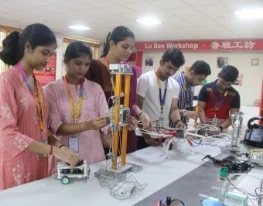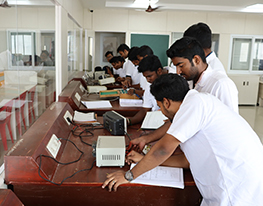1. Core Principles
- ICAMRI 2025 is committed to integrity, transparency, and fairness, following COPE’s “Good Publication Practice” guidelines
- Ethical responsibilities apply equally to authors, reviewers, and editors.
2. Author Responsibilities
- Submissions must be original, unpublished, and not under simultaneous consideration elsewhere
- Accurate representation of methods, data, and findings is mandatory. Fabrication, falsification, or inappropriate manipulation is unethical
- Proper citations must be used; instances of plagiarism trigger desk rejection .
- Authors must disclose conflicts of interest, including funding sources or affiliations
- Ethical approvals, consents, or licenses are required for studies involving human or animal subjects
- A plagiarism check using iThenticate is mandatory, and similarity above the threshold (e.g., 10%) will lead to scrutiny or rejection
3. Reviewer Responsibilities
- ICAMRI uses single‑blind review: reviewers know author identity; authors do not know reviewers.
- Reviews must be fair, unbiased, and constructive, focusing on novelty, rigor, clarity, and relevance
- Confidentiality is paramount; reviewers must not share content or use it for personal benefit .
- Reviewers must declare any conflicts of interest and recuse themselves when necessary
4. Editorial & Conference Committee Responsibilities
- Decisions rest solely on scientific merit and scope fit, independent of commercial incentives .
- The committee ensures transparent workflows, maintaining records of reviews, decisions, and correspondence .
- Vigilance against review manipulation (e.g., fraudulent reviewer identities, peer-review rings) is practiced, following COPE flowcharts.
- In case of suspected ethical breaches (e.g., plagiarism, data issues), the committee investigates per COPE procedures potential actions include rejection, retraction, or notification to authors’ institutions
5. Misconduct and Appeals
- Reports of suspected misconduct will trigger transparent, fair, and confidential investigations .
- Depending on severity, actions may include manuscript rejection, proceedings removal, author bans, or institution reporting.
- Authors may appeal decisions by submitting a written appeal within 10 days of notification; appeals are reviewed by an independent panel.
Peer Review and Publication Workflow – ICAMRI 2025
Step-by-Step Process
Step 1: Abstract Submission
- Authors submit an abstract (up to 300 words, free format).
- Reviewed by the Conference Technical Committee for relevance to:
- ICAMRI 2025 themes
- United Nations SDGs
- Publication partner scopes
- Decision:
- Accepted → Proceed to Registration
- Rejected → Exit process
- Authors of accepted abstracts must register and pay the conference fee to proceed to full paper submission.
Step 3: Full Paper Submission & Track Allocation
- Authors submit full papers in free format (single-column).
- The Journal Publication Committee evaluates each paper and decides:
- If the manuscript is of sufficient quality, novelty, and scope match for Direct Journal Submission (Regular/Special Issues), or
- If it is more appropriate for Conference Proceedings
- Authors must complete registration and fee payment.
- Authors are required to prepare a camera-ready presentation (oral or poster as applicable) for the conference.
- Presentation at the conference is mandatory for:
- Final inclusion in the proceedings or journal recommendation list
- Issuance of final certificates (presentation + participation)
Step 4: Peer Review Based on Assigned Track
Track A: Journal Submission
- Manuscript submitted to the partner Scopus-indexed journal by invitation.
- Undergoes journal-managed peer review (single or double blind).
- Journal editors make the final publication decision.
- If accepted:
- APC may apply (ICAMRI discounts provided if the Journal Open Access).
- Paper enters journal’s publication workflow (proofing, indexing).
Track B: Conference Proceedings
- Reviewed by ICAMRI’s internal peer review committee via single-blind process:
- Reviewer identity hidden, authors visible
- Minimum two reviewers per paper
- Evaluation based on originality, technical rigor, clarity, scope match
- Plagiarism check conducted via iThenticate (threshold: ≤10%)
- Outcomes:
- Accepted
- Minor/Major Revision
- Rejected
- Accepted and revised papers proceed to proofing and are included in the Scopus-indexed proceedings.
Step 5: Finalization & Publication
|
Track |
Step 6: Proofreading & Online Release
- Final proofreading is completed by the publishing team (either the journal or proceedings editor).
- Authors receive galley proofs for approval.
- Papers are published online and indexed.
Ethical Compliance
ICAMRI 2025 strictly follows COPE Core Practices:- No dual submissions or plagiarism (checked via iThenticate).
- Transparent peer review with editorial independence.
- Clear policies on authorship, conflicts of interest, and misconduct.
- All reviewers and editors are subject to confidentiality and ethical obligations.

















 ICAMRI 2025
ICAMRI 2025
